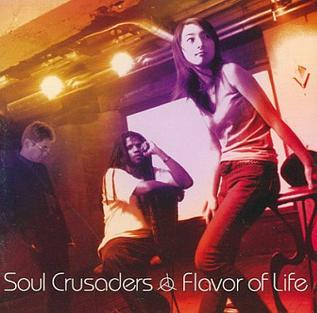Related Research Articles
Deen is a Japanese popular music band that formed in 1992. Members frequently changed until the release of the first album, and from there Deen has had four members: vocalist and lyricist Shuichi Ikemori, keyboardist and leader Koji Yamane, guitarist Shinji Tagawa and drummer Naoki Uzumoto. In January 2000, Utsumoto and in March 2018, Tagawa left the group. The band has sold over 15 million compact discs.
Crazy Ken Band (クレイジーケンバンド), also referred to as CKB, is a Japanese musical group formed in 1997 by its lead vocalist, writer and composer Ken Yokoyama. The band first came together in 1991 under the name "CK's", with a four-member lineup: Ken Yokoyama, Keiichi Hiroishi, Masao Onose and Shinya Horaguchi. This incarnation of the group was centred on a 15-man instrumental and vocal group. In 1997, Keiichi Nakanishi became the fifth member and the group's name was changed to "Crazy Ken Band".
Abingdon Boys School is a Japanese rock band formed in 2005. It consists of vocalist Takanori Nishikawa, guitarists Sunao and Hiroshi Shibasaki, and keyboardist Toshiyuki Kishi. They have released two studio albums, Abingdon Boys School (2007) and Abingdon Road (2010), both of which reached the number two position on Japan's Oricon chart.

Diamond Head was a Japanese band formed of session musicians and producers. They first gained notability as the backing and touring band for Hitomi Yaida.
Baad is a Japanese rock band that formed in 1992 and debuted in February 1993 under label Zain Records, currently signed under Giza Studio. As of 2023, its members are vocal Kyouji Yamada, drummer Kazuyoshi Aoki, guitarist Shinichiro Ohta, and bassist Kobayashi Masamichi.

Deen is the debut studio album of Japanese rock band Deen. It was released on 14 September 1994 under recording label B-Gram Records.

Wands Historical Best Album is the second greatest hits album by Japanese pop-rock band Wands. It was released on 6 November 1997 under B-Gram Records label. This is album was released by new members of Wands. Album includes singles with vocalists Show Uesugi and Jiro Waku. Most of the tracks has received completely new arranged versions. The album reached #1 in its first week and sold 174,870 copies. The album charted for 11 weeks and sold more than 379,490 copies. This is last album which reached #1 in Oricon.

Best of Wands History is the third and final greatest hits album by Japanese pop-rock band Wands. It was released on 9 June 2000 under B-Gram Records label. This album consists of selected singles and album pick-ups with vocalists Show Uesugi and Jiro Waku. The album reached #17 in its first week and sold 16,000 copies. The album charted for 4 weeks and sold more than 37,000 copies.

Flavor of Life is the first and only studio album by Japanese pop unit Soul Crusaders. It was released on October 3, 2001, through Giza Studio.
Manish were a Japanese power-pop band formed in 1992 by vocalist and lyricist, Misuzu Takahashi and composer and keyboardist, Mari Nishimoto. The band's name comes from spelling member name MA(ri)NISH(imoto). Manish disbanded in 1998.

The 59th Japan Record Awards was held on 30 December 2017. The Tokyo Broadcasting System Television network televised the show live from the New National Theatre Tokyo in Tokyo. Radio broadcast was through TBS Radio. The broadcast ran from 18:30 (JST) to 22:00 (JST). Yūki Amami and Shinichiro Azumi hosted the ceremony for the second time. The nominations and award winners were announced by TBS on 16 November 2017.
Kono Mama Kimi Dake wo Ubaisaritai (このまま君だけを奪い去りたい) is the debut single by Japanese rock band Deen. The single was released on 10 March 1993 under B-Gram Records label. It served as a commercial song to NTT DoCoMo commercials. The single debuted at number 2 and remained on number 12 the yearly Oricon charts for 1993 and was certificated with the RIAJ's Golden Disc.

Omega Tribe was a Japanese music project led by producer Koichi Fujita from 1983 to 1995. With the help of composers Tetsuji Hayashi, Tsunehiro Izumi, and Hiroshi Shinkawa, the project had three different bands with three different lead vocalists: Kiyotaka Sugiyama (1983–1985), Carlos Toshiki (1986–1991), and Masahito Arai (1993–1994). Under Fujita's directions, recordings were performed by studio musicians and production handled by the project's production team. The project has been described as helping form the city pop sound, especially with the project's usage of summer and sea themes.

Go Live is the debut studio album by South Korean boy group Stray Kids. It was released by JYP Entertainment on June 17, 2020, and distributed through Dreamus. The lead single, "God's Menu", was released the same day. The reissue edition of the album, titled In Life was released on September 14, 2020, along with eight new tracks, including lead single "Back Door".

Burn the Secret is the sixth studio album by Japanese rock band Wands. It was released on 28 October 2020 under the D-Go label. It is the band's first new album in 21 years, and also the first studio album for the fifth version of Wands with vocalist Daishi Uehara. The album consists of original material as well as new versions of songs from the second and third Wands period.

"Sekaijū no Dare Yori Kitto" is the 25th single by Japanese entertainer Miho Nakayama and a collaboration with the band Wands. Written by Show Wesugi, Nakayama, and Tetsurō Oda, the single was released on October 28, 1992, by King Records.

Version 5.0 is the seventh studio album by Japanese rock band Wands. It was released on 30 August 2023 under the D-Go label. It is the band's first new album in nearly three years, and also the second studio album for the fifth version of Wands with vocalist Daishi Uehara. The album consists of 10 original songs as well as three cover versions from the second and third Wands periods. Two of the original songs were composed and written by vocalist Daishi solely. Shibasaki confirmed that he re-mixed all of the single tracks for the album, with the exception of RAISE INSIGHT.
Shintenchi Kaibyaku Shudan: Zigzag (-真天地開闢集団-ジグザグ) is a Japanese visual kei rock band formed in 2015 and currently signed under Crimson label, subsidiaries of Giza Studio.
References
- 1 2 "About Wands Official". YouTube.
- ↑ ビーイング系アーティスト (in Japanese). uta-net. Retrieved 14 December 2008.
- ↑ "WANDS、新ボーカルを迎え第5期始動へ!" (in Japanese). the tv.
- 1 2 3 4 5 6 7 8 "高品質J-POPムーブメントを駆け抜けたWANDS" (in Japanese). Barks News. 12 January 2008. Retrieved 27 October 2008.
- ↑ "Motto Tsuyoku Dakishimeta Nara" (in Japanese). Oricon. Retrieved 3 December 2008.
- ↑ "KinKi Kidsがギネス更新!&同時首位に!" (in Japanese). Oricon. 28 December 2004. Retrieved 8 February 2009.
- ↑ "Toki no Tobira" (in Japanese). Oricon. Retrieved 25 November 2008.
- ↑ "Gold Disc Hall of Fame 8th" (in Japanese). Japan Gold Disc Award . Retrieved 14 December 2008.
- ↑ Ronald (28 December 2019). "Oricon Flashback: 1994 Year End Chart | Page 3". ARAMA! JAPAN. Retrieved 9 April 2023.
- ↑ 世界が終るまでは… (in Japanese). Oricon. Retrieved 14 December 2008.
- ↑ "List of million sellers in 1994" (in Japanese). Recording Industry Association of Japan . Retrieved 14 December 2008.
- 1 2 3 "Wands" (in Japanese). J-rock magazine. Archived from the original on 4 January 1997. Retrieved 6 January 2009.
- ↑ "Oricon Weekly Album Charts for the second week of May 1995" (in Japanese). Oricon. Retrieved 25 November 2009.
- ↑ "上杉昇15周年アルバム SPOILS 特集" (in Japanese). meVIEWsa radio. 2006. Retrieved 3 December 2008.
- ↑ "Wands" (in Japanese). Tsutaya. Retrieved 14 January 2009.
- ↑ "Show Wesugi biography" (in Japanese). Barks. Retrieved 3 December 2008.
- ↑ "UNDER:COVER 通常盤" (in Japanese). Neowing. Retrieved 4 December 2008.
- ↑ "Jiro Waku profile" (in Japanese). Jiro Waku Official Website. Archived from the original on 4 April 2004. Retrieved 15 December 2008.
- ↑ "Awake" (in Japanese). Oricon. Retrieved 25 November 2008.
- ↑ "20年ぶり復活のWANDSが再始動" (in Japanese). sanspo. 17 November 2019.
- ↑ "新ボーカルを迎えた「第5期WANDS」大阪で20年ぶりの再始動パフォーマンス" (in Japanese). Hochi News. 17 November 2019.
- ↑ "第5期WANDS始動!初ライブ生配信&年明けにニューシングル" (in Japanese). Natlaie Music.
- ↑ "WANDS、始動「続きをやってみたくなった」" (in Japanese). barks.
- ↑ "WANDS、27年ぶりにドラマ主題歌を担当「シングル第二弾です」" (in Japanese). barks.